
Giant is an epic about the life&love of 3 siblings during highspeed urban development of Gangam
"Giant" offers a dramatically stirring ride through 4 decades of recent South Korean history - 60 episodes tell a touching, upsetting, emotionally stirring and complex story set in the context of a turbo-fast urban development process in Seoul, south of the Han River: Gangnam.In passing, those episodes tell the story when Seoul and its people had to deal with a phenomenal population explosion: in 1953, 1 million people lived in Seoul. In 1960 it was 2.45 million and in 1970 it was already 6 million. Visions and plans were in demand, as were quick practical solutions and investments. Real estate speculation created a veritable gold rush atmosphere. "Giant" is about these 'gold diggers' in particular. (...and this hype about real estate speculation in Gangnam hasn't stopped until today...)
"Giant" is an epic. It is a monument and a memorial to the efforts and sacrifices of many people. The autocratic (and also often corrupt methods) of urban development become comprehensible if one considers them against the background of their time: the military dictatorship, which was inevitably characterized by the powerful influence of persons with military background in political and social decision-making processes (if you like see side note below). Instead of technical arguments and detailed examination, influence, money, bribery and position often had the say at the crucial interfaces.
If you pay a little more attention to the seemingly irrelevant details, "Giant" provides a crash course in recent South Korean history. (If you don't know or care about it, some things might be rather arbitrary or interchangeable.) In any case, the series has reached the South Koreans. In the course of its success, a further 10 episodes were added to the originally planned 50 episodes. For 40 percent of the viewers, "Giant" ranked first at the end of the 60th episode in 2010.
Ok, admittedly, there are 60 episodes. But when the time is right, you can confidently get involved. "Giant" is worth seeing. The story is told in a colorful way and played fantastically. It is emotionally gripping, touching, exciting. We accompany the protagonists over almost half a century: from their childhood in the 1970s to the year 2010. This means that actors can also show what they are made off by playing the protagonists as young. (Today they are stars of the 2020s: Yeo Jing-goo and Kim Soo-hyun). All in all, without exception, everyone delivered a strong performance. Last but not least, villain number 1, Jeong Bo-seok as Jo Pil-yeon, who holds his role brilliantly from the first to the last episode, is vividly remembered with his ice-cold laugh, which never got stuck in his throat - even in the most adverse headwinds.
The KDrama takes a sophisticated approach in telling the historical events and dynamic processes of the time through the eyes and hearts of three siblings. So, we tightly follow these stirring personal processes on the one hand, and several dubious machinations of the (fictitious) masterminds (who are quite close to the real events - see below) on the other. Against the historical background of those decades, in spectacular loopings the dramatically revolving wheel of fortune is allowed to turn to the fullest again and again, emotionally throwing the audience wildly around. KDrama shows it all.
"Giant" offers numerous stirring twists and upsetting turns in matters of love and rivalry, guilt and atonement, revenge and forgiveness. It won't be boring. All this surrounded by an indeed spectacular Gangnam urban development dynamic - at a dizzying high speed from no man's land to the hip trend district - which was not least favored by the autocratic control.
-------------------- SIDE NOTE: --- Gangnam highspeed development thanks to autocratic urban development during military dictatorship ----
There are details of everyday life during the PARK DICTATORSHIP: the influence of the military in all sorts of social issues, the secret service KCIA, which interfered unrestrainedly in domestic political issues and investigations and even used torture to interrogate people. Positions of power, like mayors, being appointed according to their military background and the level of their allegiances with Park. The backroom networks where the places, where the real decisions were made.
There are details of the subsequent DICTATORSHIP under CHUN DO-HWAN: the curfew during the state of emergency under martial law, for example. The brutally crushed democratic aspirations. The establishment of educational concentrations camps - "Giant" refers to the Samchung Camp in Yeoncheon, Gyeonggi, which was set up under the guise of fighting the threat posed by North Korean Communism. In this peculiar concentration camp, at least 60,000, probably even up to 100,000 innocent South Korean citizens were held captive in the former military prison under the most brutal conditions without an arrest warrant. There was talk of 'cleansing'. In fact, it was pure arbitrariness, verging on sadism.
And finally there is TRUE DEMOCRATIZATION of the system after the first free election for a long time - however, sadly, being faced with the same personnel (in autocratic tradition) in decisive ranks.
It has been proven that the military past in many political leadership positions during the Park dictatorship was not accidental but intentional. Among other things, of 6 Seoul mayors of that time (these were appointed, not elected), 3 had a military background. The other three were known for their expressed loyalty to the Park regime. Such people of Park's trust got the chance and used their past, their networks and opportunities as a robust standing, from where they set visionary course for the future of the capital with all means. Otherwise, rarely had the urbanization of Gangnam been as rapid as during those decades.
Gangnam beauty industry, the relevant corporate headquarters of the KPop industry, the suites and penthouses of the richest of the rich in the most exclusive apartment blocks of the country, temples of consumption of numerous luxury brands, hotspots for leisure and culture as well as some of the most prestigious schools contribute to Gangnam's dazzling image today. Gangnam with a population of over 1/2 Million recently is one of the economically most important urban districts of Seoul, in whose towers, which rise ever higher into the city sky, the very large companies of the country have their headquarters. A central transport hub has emerged and even the Ministry of Trade, Industry and Energy has taken political presence here.
It's hard to believe that 60 years ago this district south of the Han River (강 - Gang = river and 남 - Nam = south) stood for flood plains and agriculture - especially cabbage fields and plantations with the Korean Nashi pear. It was an unattractive no man's land, considering you want urban city life.
This had changed in the 1970s after Seoul faced a massive population explosion, the consequences of which the city could not cope with under the given circumstances. Previously, the city's political, economic and cultural heart had been on the north bank of the Han River in Gangbuk - in fact, since the dawn of the Joseon Dynasty. But between 1953 and 1960, in just 7 years, the population had more than doubled, practically 'overnight', from 1 million to 2.45 million. In 1970 it had already reached around 6 million! Nobody had been prepared for this. Chaos was the result. Infrastructure collapsed, slums literally sprouted out of the ground.
That's when the vision of a whole new district south of the river was born. In 1966 it was announced for the first time that the population should be redistributed in the future: 40 percent of the population should live in the northern area, 60 percent in new and densely built Gangnam. A dream in distant clouds, that's how it seemed back then, because there was nothing there at that time.
In the 1970s, the planning took on more concrete forms. Gangnam has been defined as one of Seoul's 3 central urban cores alongside the historical old town and the political center of Yeouido. In order for this to happen, construction of today's Hannam Bridge had already begun in 1966. In 1969 this important connection was completed and the first milestone was reached. Also, the Gyeongbu Expressway was opened in 1970. However, to speed up the development, Gangbuk was deliberately disadvantaged and Gangnam was privileged, for example with tax breaks. An express bus terminal was built, elite schools were relocated and comfortable new apartments were advertised. Stylish urbanity was marketed on one plot, yet rural wasteland was right next to it. The contrasts were enormous.
Yet, residential buildings started to grow at breakneck speed and people began to move to the new southern neighborhoods.
Strictly speaking, Gangnam and the education of an elite school district also marks the beginning of the now enormously profitable private education market and some social excesses, which to this day provide the KDrama market with plenty of material for the most bizarre stories. In addition, speculation in real estate became fashionable and became a new hobby for (more or less) rich wives. Eventually, Gangnam also earned its reputation as an entertainment district, with clubs staying open all night.
The story of Gangnam reads dazzling and spectacular. But the city itself initially had no money for all the investments that were necessary to develop the land. It relied on income from sale of the land set out for recompense from the land readjustment programs. All started slowly, because interested buyers withdrew, disappointed since there was hardly anything really urban in Gangnam in the early 1970s. In order to speed up the processes, a law was passed in 1972 that deliberately relaxed the existing tax regulations relating to property regulations. From then on, profits from real estate speculation were practically tax-free. Trade tax, property tax, etc. were also waived for the next 6 years. This temporary incentive for investors proved extremely successful, but also problematic. This brought speculators onto the scene, who didn't care at all about professional urban development as such.
Thus, remarkable performance comes with sad collateral damage. The catastrophes associated with sloppiness in construction and human fault in the wake of corruption pave the decades just as much as the milestones of urban development. The biggest accidents in this context were, for example, the collapse of the Wawoo residential complex and the Seongsu Bridge. (Others followed at regular intervals. Every decade has its own list...)
Autocratic regulations, the need for speed and the money involved also encouraged flourishing and unchecked corruption regarding insider trading with real estate speculation, building tenders and bidding. Bribery shaped the entire business world. This also promoted a climate in which - if someone was convicted of his illegal activities - he (usually a 'he') was easily released soon later on.
While the giants were able to pocket their gigantic profits without restraint, the population of Gangnam suffered (and still suffers) from housing costs that exceed every measure.
Finally, within this whole developmental process, the lending business has been a crucial and lucrative business since the very beginning until up to date, even if customers and their needs may have changed in the meantime...
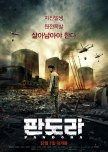
A disaster movie, yet using emotional + vivid suggestive power in the tradition of anti-war-movies
"Pandora" is a disaster movie.I don't really consider myself a fan of this genre, which focuses on mass panic and adrenaline.
However, I consider this KMovie particularly valuable.
In this case I think the makers have succeeded in doing something similar to what anti-war movies try to achieve: deterrence by vividly conveying the threatening horror. In respect to the scenario of a nuclear catastrophe the movie applies emotional and vivid suggestive power, at the same time making people think and possibly question the sense and usefulness of highly dangerous nuclear power plants.
In view of the consecutive radical change of South Korea's nuclear policy six months after "Pandora" was released, one could say: the project was worth it. (It would probably be too daring to talk about causality, but it could be considered a noticeable correlation...)
The 2016 KMovie picks up on the 2011 Fukushima nuclear disaster and, against this background, develops a story that is comparable by South Korean standards. South Korea is the country with the highest population density in the immediate vicinity of its nuclear power plants. However, due to its insular position, a realistic evacuation plan in the event of a disaster is a major problem. With the movie "Pandora" the lid of the legendary box is shaken. In this case, a nuclear power plant on the East Coast suffers earthquake damage and radiation leaks, similar to Fukushima 5 years earlier. The film fictionally exercises the processes in the event of such a catastrophe (or a comparable one) and comes full circle with a deliberately touching scene in which Kim Nam-gil makes an emphatic plea against nuclear power in his usual impressively passionate way.
Regarding such critically oriented material, the production obviously had difficulties with its financing - in South Korea the lobby of the nuclear industry is as powerful as anywhere else. Nevertheless, the ambitious project could be realized through crowdfunding.
------------------------ SIDE NOTE: --- Sobering facts/outlook on nuclear power plants in South Korea ---
"Pandora" was released in December 2016.
In early summer 2017, as one of the existing South Korean nuclear reactors was actually scheduled to be shut down, President Moon Jae-in announced that the country's nuclear-focused energy policy would be stopped and that the country would instead steer towards a nuclear-free era. Accordingly, plans to build new reactors or extend the life of existing ones have been abandoned. A sign of hope?
However, by the autumn of the same year already, the government's political commitment was no longer valid. The nuclear lobby has actually been able to exert such pressure (the President's faction not having a majority in Parliament....) and prevail that new power plants were going to be built again.
South Korea's nuclear companies make a lot of money by exporting their self-developed reactors. The companies want reference projects in their own country... it is as simple as that...
As far as the people are concerned: According to a survey by the polling institute Realmeter in 2018, 61 percent of adult South Koreans still firmly support their president’s original nuclear phase-out course. Another 10 percent tend to do so. Yet, the lobby as so often has more to say...
... To date, South Korea covers a third of its electricity needs with 24 nuclear reactors.
... There are always earthquakes on the peninsula...
------------------------
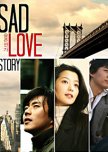
Yes, it is sentimental. Yes, it is emotionally intense. Yes it is a Love Story - KDrama style.
"Sad Love Story" marks the beginning of the wave of success that over the past two decades has carried KDrama far across the South Korean peninsula. It has mastered the art of telling drama in a way that grips the heart and doesn't let go until the end - even if some aspects are predictable and there are clichés: the journey is the goal. One is always close to the emotions of the protagonists and they move unrestrainedly up and down. More drama is always possible. Yes, it is sentimental. Yes, it intends to be emotionally intense. Yes it is a Love Story - KDrama style.Actually, "Sad Love Story" is a love story through and through. Touching in all possible directions. Obviously 'sad' too. The story navigates between 'blissful' and 'desperate' within a fascinating field of tension and relentlessly takes the audience along. At the same time, "Sad Love Story" is a study of how often supposedly small interventions (actually more like assaults) - sometimes nasty and selfishly motivated, sometimes noble and well-meaning - can mercilessly plunge one (or more) lives into misfortune. The level of pain and suffering people can endure is amazing (and encouraging). This story is fictional, but reality is full of it in all sorts of variations.
Among other things, in this KDrama one is confronted with the USA - from a South Korean perspective. That's quite interesting, too. "Sad Love Story" thus points towards a reality that people in the 21st century might be happy to forget. South Koreans and Germans probably have this in common: the presence of foreign military forces. Since the Korean War of 1950-1953, the USA, as an ally, has operated various military bases in South Korea to help defend the country in the event of a military threat from North Korea. After Japan and Germany, the United States is showing its strongest military presence with its troops stationed in South Korea. Camp Humphreys south of Seoul is the largest unit with US military personnel stationed overseas. There are several more, i.e. including Army Garrison Yongsan in Seoul, Camp Walker in Daegu, United States Navy Fleet Activities Chinhae near Busan, and two Air Force stations in Osan and Gunsan south of Seoul.
------------------ SIDE NOTE: --- "American Towns" ---
"Sad Love Story" puts the "America Town" (or "A-Town") of Gunsan in the focus of the story. The Air Force Station on the west coast is rather small, but the stationing of the US soldiers ensured that an entertainment culture geared to their specific needs was established. "American Town" in Gunsan is not the only one of its kind. They have thrived around all of these US bases since the 1950s. For example, today's hip Itaewon with its famous red-light district "Hooker Hill" in Seoul dates back to this "A-Town" culture, which specialized in entertaining the American GIs. Bars, restaurants, shops, services. Particularly lucrative: brothels... The KDrama also makes reference to the GI entertainment culture in the larger cities as it progresses. And finally also to the somewhat 'other' reality behind the dazzling GI heroes in uniform, which sometimes appears quite sobering when back 'at home' in the USA...
The "A-Town" was designated as an independent area with special "tourist facilities". It is a contractually regulated fringe zone, coordinated between the USA and South Korea - an intermediate world with its own laws. In spatial terms, too, it is located between the actual residential area (e.g. the city of Gunsan) and the air base. It consists of a cluster of bars, shops, restaurants and a few hundred small apartment buildings, each consisting of one room, kitchenette and toilet. Here lived the prostitutes, barmaids, singers...
----------------------------------------------------
In "Sad Love Story", the protagonist's mother runs a bar in "American Town", that optionally offers additional comforting services, while the protagonist's aunt is a singer in this bar. Together with other employees, they live in the immediate vicinity of each other and form a kind of community, so to speak. The "A-Town" forms the setting in which most of the characters in this KDrama grow up or live. It's a world of its own. It is at the same time an existential basis, a shackle, a flaw and the driving force to wanting to break out. It is also the place of greatest happiness and source of inspiration for the two protagonists.
Anyone watching this series should have a handkerchief or two handy. The Wheel of Fortune challengingly turns for two souls who are deeply connected in love and who mutually encourage each other to actually be true to who they are. Mercilessly the wheel turns and turns and turns... To a certain extent, actor Kwon Sang-woo ties directly into his role in "Stairway to Heaven", while actress Kim Hee-sun shines as a stoically frugal blind person who due to her disability is often helplessly at the mercy of her environment.
I admint, I forgot quite a few KDramas relatively quickly after watching. However, there are some, that due to their emotional intensity, today are still as present as if I had just seen them. These KDramas create a state of being that one doesn't really want to leave - also (or precisely because) it consistently remains in this characteristic conflict between weal and woe. And I am sure, "Sad Love Story" will also be one of those memorable ones. The soundtrack skillfully catches this situation and never tires of throwing in its leitmotifs as a pacemaker. "Sad Love Story" may be 'old', also outdated in format and style, but at the same time the series is timeless. In its mercilessly stirring mixture of love story and makjang it´s one of several masterpieces of the early 2000s that offer Love-Story-telling in its unique KDrama way. It is not about ´watching´ a story from the outside, but letting it in and empathizing. However, you have to like this style. Also the repeated holding on to the emotional key scenes. E.g. the topic itself has long since been told, but so that it also emotionally reaches the audience, the shot stays a little longer...
It should also be noted that the mixing with the US military and the scenes in the USA required a comparatively active participation of ´American´ actors. Those who also speak Korean (for an uncomplicated, smooth organization on the set) are probably rather rare. The talented ones among those obviously even more so. In this respect, the production inevitably breaks down a bit in terms of its acting quality.
And last but not least: In general, the early KWave productions are still more soap-like-style and not comparable to those Netflix (co-)productions over the past 6 years. Being spoiled by recent production quality, one can certainly linger on one or the other detail, as well as on the abundance of episodes (i.e. more and more and even more maybe unnecessary emotional loopings for the actual story to be told). If you have a problem with that, I would not recommend this KDrama.
"Sad Love Story" is for lovers of mercilessly intense emotional, slow-paced Makjang Love-Stories with plenty of heartache and a clenched fist in the pocket (and sometimes in the face).
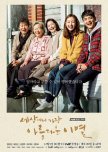
Very humane. Tangible. Touching, yet not maudlin. Sad, yes. But unpretentiously radiating, too.
"The Most Beautiful Goodbye" is a KDrama that consists of only 4 episodes. However, they have it all and are completely sufficient to leave their mark in the sand. We are confronted with the limits of healthcare system - when medicine no longer has a solution to offer and people are left with themselves and what they are: mortal beings. In ruthless directness, the viewers are confronted with what many people (all over the world) might at some point face in one way or another.The family here is not particularly rich and not particularly poor. The individual protagonists are not particularly successful and have not particularly failed. Everyone lives their (South Korean) life as best they can. Not very happy and not very unhappy. With a tendency not to not be so happy. But they are actually not really unhappy either. In fact, everything could be quite nice, but everyone is just too busy with themselves. The WE becomes self-evident and rather annoying... until the day the finitude of being was knocking on the door...
However, hello-wake-up does not imply everyone starts reinventing themselves, overcoming their weaknesses and becoming better people. It does, however, force them to reflect on what they have and what they have forgotten (to love) (consciously) despite everything being taken for granted. In stumbling everyone is searching for an expression of their own feelings. At least they try to be a little bit more alert about what is going on in their life.
Very humane. Tangible. Touching, yet not maudlin. Pretty close to life. People are clumsy, speechless and helpless, as akward as it gets. It is a lesson in compassion, triggering your own experiences, when it comes to similarily unprepared being confronted with any form of (unwanted as it is) final farewell.
Sad, yes. But unpretentiously radiating, too.
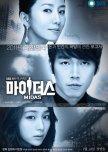
Balancing genius, intuition & healthy grounding in an elite jungle of an addictive financial world
How far can you go? The focus of these KDramas is greed for BIG money, which has long since lost any reasonable connection to life and people. It's about stock deals by the super-rich, insider trading, short selling, mergers and acquisitions.Hiding behind the title "Midas" is the legendary story of the ancient King Midas. It is said that as a child, ants would put grains of wheat in his mouth while he was sleeping. He was later granted a wish by Dionysus, wishing that everything he touched would turn to gold. The consequences though were life-threatening, because actually everything he came into contact with turned to gold, including food and drinks... The story of the KDrama operates both with the dictum "to have a golden hand", which is inspired by this legend, and with the psychoanalytic concept "Midas complex", which has proven itself in connection with pathological greed.
The protagonists in "Midas" have an offensive urge, almost addictive, to make even more profit with daring investment strategies, sometimes risking to lose the ground under their feet and maneuver themself into existential situations. This KDrama is about the challenge of balancing genius, intuition and a healthy grounding within the elite jungle of an addictive financial world. Thrilling story, complex character studies and emotional rollercoaster are guaranteed. In this world where money, intelligence and high speed set the tone, the intuitive feeling for the right timing prevails. "Midas" broadens the horizon from the (rather usual) Jaebeol family intrigues and inheritance disputes, which also have their place here, to - without regard to losses - partly illegal machinations in the financial world.
"Midas" is sketching a world of high risk and high numbers - abstract, fast pace, fashionable, cold. Yet it is an emotionally intense in-depth study about temptation, including space and time for morals. However, a spot here and there, where the warm and tender wind blows, is given, too. Some call it love...
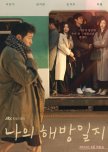
Progressive Message: Quality of life increases with the degree of truthfulness (not scham&pretence)
"My Liberation Notes" is a ray of hope within South Korean series production.In short: The lives of young people in their prime (+/- 30) are at stake here. Considering their groaning under the pressure of the competition in the workplace, the dazzling promises of the modern lifestyle industry, and the claims of society and family traditions, this could all be pretty depressing. But amazingly, it's not. The protagonists manage to give their lives something like dignity - quietly, impressively and with gentle intensity. They walk the way that lies before them, spraying their personal touch, a little bit, but nicely, thus leaving color and warmth on their trail.
The KDrama presents itself as a Netflix co-production and is thus in a certain way 'pimped' for an international audience - you don't see anything of the typical and rather special elements like makjang, slapstick, glitter & glamor of Jaebeol, or traumatic childhood secrets. Just life, every day, like everywhere else. Without spectacular ups and downs. As if someone had blindly reached into a pot full of addresses from a random location on the outskirts of metropolitan Seoul and then simply turned the spotlight and camera on the family living there for a while. In principle, it could be any family living near the terminal stations of the Seoul subway network. This, however, identifies the KDrama as specifically South Korean. Finally, the story is high KDrama quality, when it comes to a carefully, multi-layered narrative with deliberately reduced pace and space for the sensitive moments in between.
----------------- SIDE NOTE: --- Provincial life in the metropolitan area around the capital Seoul ---
So the KDrama simply tells about the normal life of relatively normal people around 30. They don't live in the megacity of Seoul (while almost 10 million people do) or in Incheon (with almost 3 million inhabitants), but in the sprawling province of Gyeonggi-do, which makes up the majority of the metropolitan area around Seoul in terms of space. The provincial population makes up ca half of the population of the more than 25 million inhabitants of the entire agglomeration around the capital Seoul. (And this in fact is about half of the inhabitants of South Korea altogether). An insight into the living environment of those provincial residents thus also offers an insight into a good deal of current South Korean life issues.
The fictional 'Dangmi Station' is actually Line 1's 'Seonghwan Station'. Crucially, most people who work in Seoul (increasingly) cannot afford to live in the city. Every workday they commute about +/- 2 hours to do their job in the city. With the evening company dinners and collegial come-togethers, a day becomes very long. There isn't much time left for a life of your own outside of work. While it is convenient in many respects to remain in the family home until marriage, this further reduces the amount of free time you have at your disposal. Especially if the parents still do a bit of farming and the help of the 'children' is required here and there.
City and country clash, almost every day. Accordingly, different life plans collide, which either fit more into a fast-paced, hip city life or rather into a rural, decelerated provincial life. In reality, however, new hybrid variants are needed that function as a flexible joint between both realities that are equally relevant to everyday life - city and country.
You might want to think about the meaning of life. About goals that you would like to set for yourself. What is life? What does it offer me? What would I actually like to do? Or, wait a minute, is it better not to think at all? It is up to the young people of the recent and the following working generation, to grope, to stumble, to develop new, visionary as well as down to earth attitudes and inspiring blueprints to life in a South Korea from the 2020s onwards...
------------------
"My Liberation Notes" sails in this field of tension. Other than that, tension is not on the agenda. "My Liberation Notes" is processing the wisdom, the questions and the insights that the protagonists come up with over the course of the story - sometimes quietly to themselves, sometimes in conversation with friends.
The focus is on 4 protagonists who practically all live together in the provincial suburb of Seoul. Three of them are siblings and work in Seoul, the fourth is a stranger who helps their father in the carpentry shop and in the fields, eats with the family and lives next door. (A fantastic Son Seok-ko as an inscrutable stranger, as well as Lee Min-ki, Kim Ji-won and Lee-El as very different siblings, are presenting the range of everyday emotional worlds in a wonderfully haunting way.) All four wrestle with life in their very own manner and question, what freedom and quality of life could mean to them under the given circumstances. Promotion? Money? Success? A car? A partner? Marriage? Family? Living in an apartment in Seoul? Where is life? Is this life?
Eventually the aspect of reverence also comes to the fore: To respect and be respected. To be worshipped. To be adored... Yet how to express mutual adoration and respect (in order for your own life to feel maybe a bit more valuable)? ... Maybe just give it more space. That would be great...
The episodes pass as does life itself. The days are the same, and yet each one is new and different from the one before. Happiness is accumulated by the minute. And in the end, life is beautiful after all. Worth living. Distinctive. The quality increases with the degree of truthfulness that they give to their lives. And that's indeed a progressive message (as far as a society like the South Korean with its highly valued tradition of scham and pretence is concerned.)
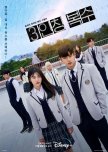
A sad & highly topical social issue, dealt with in a palpable, exciting, sensitive, touching way
"Revenge of Others" is set in the world of South Korean high school students. No teenage squabble, but a story with substance and depth. With flexibly intertwined subplots, it offers a sad and highly topical social issue, dealing with it in a palpable, exciting, sensitive and touching way. Should you watch? Yes!"Revenge of Others" (like "Weak Hero Class 1" in 2022) deals with the topic of mobbing /bullying. In Korean, the slang term 'wang-ta' is quite common, and for me helped for a better understanding of the special and increasingly dramatic situation surrounding bullying at South Korean schools, which can even lead to suicide. (See side note below.)
This KDrama spotlights a Seoul high school where there appears to have happened a suicide. Everyone is shocked. Some know more. But if the sister of the victim, who has been living separated from her brother for many years, would not try to get to the bottom of it, then this would be a sad case of suicide without a murmur. It probably happens all too often in one way or another that fundamental questions in an apparently obvious case are left unanswered. However, this KDrama bravely wants to get to the bottom of the matter and its circumstances - here in the person of Ok Chang-mi.
As so often in the context of bullying, the adults don't look too good and don´t offer anything promising for making a difference regarding those fatal peer group dynamics. They are left outside. The high school students have to find a way for themselves to get along with their classmates - if possible highly adjusted underneath the social wang-ta radar (or at least with a solid network).
"Revenge of Others" is a production for the international streaming market. Things rarely get too brutal at Disney, though. The amount of violence is therefore limited (compared to e.g. "Weak Hero Class 1") and instead there is more room for relationship dynamics in side plots, causal connections and shades of gray.
By the way, in connection with "Revenge of Others" there is also a whole series of promising actors to admire!
---------------------------------
SIDE NOTE: --- Wang-ta in South Korea ----
With Wang-ta, the focus is not so much on the 'act' - bullying or harassment - but rather on the entire context of active and violent marginalizatin of an outsider. For example, it can be used as a swear word for the excluded person or as a description of the bullying activity. In a collectivist society like South Korea, group affiliation and group interest is paramount. This applies not only to the family, but also to the school class and also to the peer groups within the class or school. Unfortunately, this value system results in a fatal situation when it comes to actual bullying: bringing shame on the group, the outsiders are at the bottom of the social hierarchy. Whether it's because of school performance, family background, origin, belonging to an undesirable minority, looks, dress, a handicap, an unusual belief or an abnormal inclination: Wang-ta is a label that no one wants to personally be confronted with. Everyone agrees on that. At the same time, Wang-ta becomes a free pass for more or less cruel mobbing/bullying. Worryingly, perpetrators, victims, and witnesses alike accept the premise: all forms of bullying, almost anything related to Wang-ta, is permissible. The perpetrators take advantage of this, the victims immediately feel even more inferior in terms of their shortcomings (of whatever kind), and the bystanders silently nod the action as justified - or even actively join in. There is no moral barrier against this specifically cultural, collectivist background. It can even get out of hand. There are cases where the entire school has ended up participating in one person's wang-ta. From a Western, individualistic point of view, this is perhaps difficult to understand, because apart from group norms there are other socially recognized ethical principles that could be introduced as a serious confrontation of wang-ta behavior. Unfortunately, this hardly is the case at South Korean schools with a collectivistic social culture.
--------------------------------------
SIDE NOTE: In connection with this KDRama also an additional side note on
--- Punishment vs. Suffering of Victims ---
The psychological trauma for the bullying victims are with long-lasting effect. Unfortunately, the punishment of perpetrators is not proportionate to this day. Punishment is rather harmless - it may be annoying to the perpetrators, but not really a deterrent. Far too much must have happened before expulsion actually occurs. A corresponding entry in the files is actually completely deleted two years after graduation. In fact, nothing is left behind on the perpetrators' side. On the other hand, from the memory of the victims the experience cannot be so easily erased ...
The documented cases of wang-ta in South Korean schools (yet many are not officially reported) have steadily increased over the past three decades. According to a study by the Ministry of Education, between 2013 and 2017 the cases have more than doubled from 11.749 to 31.130. There are also increasing numbers of victims who saw suicide as their only way out. It has now been empirically documented that South Korean pupils with a personal Wang-ta experience are more suicidal than those without. Suicide is by far the most common cause of death among 10 to 24 year olds. Almost 1.000 young people took their own lives in 2020 alone.
In respect of the lack of serious consequences for the perpetrators in Wang-ta cases and their comparatively unsatisfactory punishment, a kind of vigilante justice has been established among the families of the victims concerned. "Revenge of Others" picks up on this (similar to "Angry Mom" a few years earlier) as a theme in variation.
In fact, facing a lack of serious alternative punitive measures it seems not uncommon for relatives of victims to pay someone of the same school age to take care of an appropriate 'punishment' - i.e. 'undercover'. Clearing up violence with violence is of course a dubious solution. Sadly, this seems to be the only way to show real consequences to the perpetrators and give the victims at least minimum size satisfaction. ...Although it should be probably considered more of a satisfaction for the relatives of the victims, because the victims themselves still have to deal with their psychological wounds and scars for a long time. Revenge does not undo the painful experience of mentally and physically harassing exclusion...
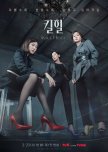
Lee Hye-young and her role operate as backbone and heartbeat of this KDrama
"Kill Heel" is set in the milieu of teleshopping. The pace is leisurely, calm. The light is dimmed sort of. The focus is on 3 women. Their heels are dizzyingly high.At first, the story leaves the audience feeling a bit lost. Just one thing is obvious: the competition in the production company is extremely tough. But over time, the three protagonists get more profile and the story heads in it´s direction.
The driving force that really makes the KDrama worth seeing is, above all, veteran Lee Hye-young, who has experienced a real revival in recent years. Here, in the ambivalent character of Gi Mo-ran, she gave another marvellous performance! In my eyes she (and her role) operate as backbone and heartbeat of this KDrama
It's about intrigues, struggle for survival, hurt feelings and old traumas. The relationship dynamics between the 3 women intelligently intertwine and dissolve in a subtle but unexpected way.
"Kill Heel" has a very unique look and feel to it and comes along with a peculiar pull effect. There is suspense, but at the same time the suspense isn't setting the tone. Sometimes something seemingly builds up, but then everything is completely different again. And after 14 episodes it's over. What a pity, actually...
------ SIDE NOTE: ---Teleshopping---
I wasn't really aware of the impact of teleshopping until now. In Europe within homeshopping Germany is the leader, when it comes to sales figures through teleshopping (compared to online-shopping) . In South Korea, teleshopping accounts for almost 50 percent of home shopping. Similar to sales parties in private circles (Tupper & co.), teleshopping thrives on impulse purchases and customer loyalty, which are promoted by a harmonious, interactive, relaxed sense of community. Within the virtual television community, it is the presenters who foster this intimacy with their virtual customers. Women in particular buy in teleshops.
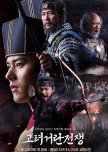
KDrama sure can do historical drama. Goryeo-Khitan War is another prime example of this
"Goryeo Khitan War" is a historical epic intended to honor not only the historically exceptional achievements during the Goryeo-Khitan War, but also half a century of KBS (Korean Broadcasting System). And it does. Perfectly done in all instances and scales. What's even more fascinating is how it succeeds to fill ca. 1,000 years long bygone history with life in a gripping way - close to the facts and colorfully embedded within the midst of the political milieu surrounding the royal court.If I hadn't accidentally stumbled into the filming set in the early summer of 2023, this thoroughly historical KDrama might have slipped a bit back on my list. But this personal connection eventually made me more curious. And now I'm full of praise.
32 hours long history lesson - history can be told so vividly… Complex personalities, an even more complex political context and a highly demanding challenge of war come very close to the audience. You don't have to be of Korean origin to be inspired - by its heart, intelligence, daring, perseverance and humanistic ethos. It is not about simply enumerating historic facts. It is colorful, complex, character driven – what happened about 1.000 years ago comes as close as it gets: Those years around the turn of the millennium at the beginning of the 11th century, when the 8th king of Goryeo - the then still quite young Hyeongjong of Goryeo - had to face the successive invasions of the numerically superior, Khitan of the Liao Dynasty.
What happened way back then obviously has happened a long time ago, but actually many policymakers today could be inspired and encouraged by the political attitude that is being exercised here. Even though facing the acute threat, this canny, courageous, responsible king isn´t willing to simply fly on sight, but rather acts cool-headed and with foresight. He is someone who does not shy away from complex, fundamental, unpopular, but far-reaching, forward-looking structural reforms... And then there is a government official, who not simply and opportunistically cares about himself, but about the cause - about the people, the country and the ´good´ (even if uncomfortable) decision.
The book "Sweet Rain in Winter" by Gil Seung-soo certainly contributed significantly to an excellent script. The historical greats, both large and small, impressively come to life. Romance is secondary, bromance is the theme here. By this I mean less the homosexuality of Mokjong, the 7th king of Goryeo. Rather, the intense struggle and relationship between King Hyeonjong and Gang Gam-chan, a scholar, government official, mentor of the king and crucial military commander during the third Goryeo invasion.
The KDrama offers a distinctively Korean (chapter of hi)story. One with a lot of pathos and even more ethos. One about people and their relationship dynamics, about their character strengths and weaknesses.
KDrama sure can do historical drama. Goryeo-Khitan War is another prime example of this.

Years after the “Yes”-word, and yet a substantial love story, touching without being kitschy
"The Wind Blows" sounds quite inconspicuous, but it is not. It turns out to be a moving love story. Actually it is rom+/-com that starts exactly where other love stories end: with the ´yes´ word. The KDrama tells of what can happen when the butterflies (in the face of the new) are followed by ordinary years of shared, sometimes painful everyday life relationship... But that's not why love has to be gone missing. On the contrary... yet eventually, love might find it harder to take its space...The title "The Wind Blows" refers specifically to the moment when the two protagonists first met many years ago. At that time the wind was blowing. What started then is not over yet. Figuratively, the wind is still blowing. However, the everyday challenges of aging have now added to their married life. The two must meet those challenges. It is rather common that one may be tempted here and there to make solitary decisions instead of communicating. One may have doubts if there still can be a way together. Every now and then it seems that such a common path is not (or no longer) possible. And then, maybe, one or the other might open up again.
"The Wind Blows" tells a serious and profound story about a love relationship that has grown out of the first romantic phases. Generally, this is less wanted on screen, as it inevitabely comes with problems, arguments and breakups. (Somehow that's in the nature of relationship - the constant rubbing against each other in a wide variety of ways actually leads to feeling/sensing yourself and the other person in the first place... it doesn't work without it. Does it?) In this KDrama, problems, arguments and breakups are all in, too. But so is love. (...as so often, although we might fail to notice in the midst of turmoil.)
I don't want to hide the fact that Alzheimer's disease is involved here as a stab in the back and at the same time a second chance. Against this background, the story manages to tell sensitively, empathetically and at times ruthlessly about the bumpy stretches of a patient love that has been and remains there over time - even if it is experienced differently over the course of the years, perhaps sometimes cannot be shared and also has changed its forms of expression over time.
The sensitive processing and the emotionally intense acting (great: Kam Woo-sung and Kim Ha-neul) are KDrama quality at its finest, which has once again proven itself to be just perfect for dealing with such a complex subject, which is difficult in several respects. A substantial story, touching without being kitschy.
(Well, I didn´t need the slightly shallow subplot and few unnecessarily humorous sequences here and there. Yet they obviously tried to loosen things up... well...)
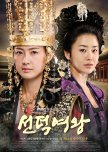
Brilliant. Timeless epic quality of emotionally processing the life of 2 historic heroines
This KDrama tells historical heroine stories for a change. (Yes: female AND plural.) On top of that, enriched along the way with some highly topical insights and a vivid examination of management systems - what does the common people need? How does it want or have to be lead? In this respect, the 2009 series has not lost any of its topicality. But above all, "Queen Seondeok" brings the viewers closer to the earlier (not so well represented in KDrama and KMovie) Korean history of the Three Kingdoms.Here, history is presented in 62 episodes in a moving manner and in dazzling characters, while offering valuable historical input. 62 episodes should not frighten you. This is perhaps more like 5 or 6 seasons western style. You don't have to go through all the episodes in one go, (but you can of course). To be honest, the number of episodes and the rather stiff-looking poster with a heavy crown kept me from watching the series for a long time. But that was a big mistake. This series is wonderful in view of the wealth of impressions, personal processes of the protagonists, and the profound examination of the attitude and philosophy of rulers. Also funny in places. In any case, an impressive piece of Korean history that is told in a round, rich and colorful way. The KDrama leaves nothing out when it comes to being human and being a hero - it presents all of this in various dramaturgical entanglements and depths, with twists & turns and deep feeling. (Swords, bows and battles are also included.)
This is about real historical personalities from Korean history, who made remarkable achievements in their time. First and foremost Queen Seondeok. She was the first Queen of Silla and the first of the few female heads of state in Korean history. If one considers her progressive achievements for her people, she must have been a charismatic personality in order to be able to place herself in the first, officially leading position in this feudal male world. Her life, but also that of other contemporary significant, history-shaping people in her environment are prepared dramaturgically lively and unforgettable. Admittedly enriched with a bit of poetic freedom in the service of a compelling and exciting story. However, in the historical drama orbit, it seems to me quite acceptable to bend the facts here and there in order to create a vivid impression of the character of the historical figures and their work instead. This is much more memorable (in passing) than exact chronologies. In addition, the actual valid sources that can be evaluated are limited. Even historiography has to do a bit of guessing every now and then to understand where, for example, a woman at that time got the vision, the strength and the courage to put men in the second row - and at the same time intelligent, visionary and with respect for the people, to rule in an almost idiosyncratic way.... In my opinion, the fictional plot does not damage the essential impression that one gets about life and challenges in the Silla Reich, about the charisma of the historical personality of Queen Seondeok and the historical figures around her plus her achievements for her people. The KDrama draws a memorable, unforgettable character portrait of the Silla Empire in the 7th century. In doing so, it brings the bones of the queen lying under one of the burial mounds in Gyeongju to life again.
Good to know: The Silla Empire was not yet under the influence of Confucianism, which clearly defines the man as the head of the family/tribe. Among the noble Silla families there were also those in which descent on the mother's side was decisive, or women were considered the heads of the family. At that time, matrilineal and patrilineal tribal structures still existed in parallel. Therefore, the respect for women and their functions in society was comparatively higher overall - but still not a matter of course.
For me, what is valuable about this story (and at the same time the timeless quality of the KDrama) lies in the juxtaposition of two very different, each impressive, intelligent female figures of their time: Princess Deokman (Queen Seondeok) and the noble concubine Misil, who hardly had an influential king or leader of the Hwarang left out during her time in order to directly influence political events. In fact, the two women did not live at the same time, but poetic freedom overrides this and juxtaposes the two as equal antagonists. (Extremely successful!)
The KDrama "Queen Seondeok" is characterized by a timeless epic quality in the emotional processing of the historical events. Brilliantly done in places, quite funny at times, with colorful vividness and everything that life usually entails: plenty of drama that stirs the spirits and also touches the heart. An exciting script (which in the second half has to work through a little more historical facts), and a colorful dance of highly inspired mimes, reviving those distant 50 years in the past 7th century. Not only the later queen and the concubine Misil get a memorable profile, also the men around Queen Seongeok - Bidam and Kim Yushin - are noticeably filled with life. Love story included - it's more of an encore than the main thing when it comes to the entire story, but it refreshes the second half as a balance to the historical ride through time.
By the way, the ratings literally went through the roof at 43.6 percent when the series was broadcast on television in 2009.
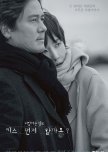
A three-dimensional, grown-up love story, sensitively told and spiritedly acted
When people have lived for more than four decades, they are usually disillusioned in many ways. Hope for romance and love has given way to various, quite specific experiences... and these are inevitably paved with disappointment and suffering, too. However, it´s not necessarily too late for a new love. It might be different, though. More grounded. Honest. Upright. Less games. Sincere closeness and warmth become more important than romantic squabble. The time ahead is finite. And you no longer expect a fairy tale full of magic, but rather wish for true moments, a safe place to catch your breath and recharge your batteries. Reliability. Trust and emotional intimacy.The protagonists in "Should we Kiss First" have all been through life for some time. The two main characters have had children and lost them again, have been married and divorced, lived more or less honest but empty lives. SHE has been a stewardess for 20 years and suffers from insomnia. HE is a co-founder of an advertising agency and has cancer. Neither of them want to be alone. Neither of them want a relationship. Hm. Difficult. Their best friends each want to pair them off ... and at last are successful. However - being in makjang KDrama Land - the past of the protagonists gets involved in the present and triggers a lot of turbulence.
"Should we Kiss First" focuses on two adults who (re)experience love in a way they never expected. Love is not primarily supple, sexy and redeeming, but presents itself as irrational, brittle, stubborn and complex. As such, it demands one thing unconditionally: complete surrender to this feeling, which remains in spite of adversities, yet does not solve any problems. However gives the necessary strength to face them.
Does this power come from the love you experience from someone? Or from the love that you give yourself? The beauty of this KDrama is placing the emphasis on the fact that it is your own radiance which makes a difference. The love we open up to and give in to makes the difference how we experience life, or what options we recognize and choose... It's about giving in to your feelings, letting them be (even if you rather not put up with it) and trusting them.
The story is told in different nuances - sometimes humorous, sometimes profound, sometimes tender, sometimes playful, sometimes harsh, even fists are flying at times. Enjoying the moment to the fullest and the pure love of life have just as much space as the desolate moments of emptiness, embarrassment, destructive anger and listless lethargy. The dialogues are carefully chosen down to the last detail. And then there are the subplots, that round the story off.
A three-dimensional, grown-up love story. Yes, once again a story about love, but not cheesy. Instead, the story is sensitively told, spiritedly acted and filled with a love for detail. On top of that, a story full of sometimes subtle, sometimes explicit wisdom. A KDrama that doesn't sugarcoat anything, yet feeds you with a satisfying sigh.
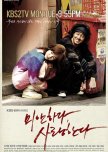
Truly touching. It makes you angry and concerned, too. You will ride in a rollercoaster of emotions.
"Sorry, I Love You" is an early masterpiece of proven KDrama art, which once again juggles the injustices of ordinary people with sensitive finesse in an emotionally draining manner - against the background of a South Korean sensitively reinterpreted Romeo & Juliet love story.Humiliation, exploitation, devaluation are the everyday life of the socially weak, while the celebrated, influential contemporaries seem to know no shame in their arrogance and haughtiness.
So Ji-sub hauntingly embodies subtly controlled, concentrated, suppressed anger. In the character of the protagonist, hate and compassion, love and indifference are combined in a fatal mixture. He becomes an incalculable time bomb that could be activated at any time.
Of all the early Makjang-infused KDramas, "Sorry, I Love You" is one of my favourites. Even if 'love' is bold in the title, the story doesnt´t romanticize it in a striking and cliché-like manner, yet the KDrama tells the story understated elegantly, but no less touchingly and also sincerely (...and of course dramatically tangled in a complex way.)
There is brother rivalry, revenge, swapped babies, secrets, complicated feelings, accidents, illnesses - the whole program prepared in a new mixture. The KDrama expresses in a concentrated, mostly subtly restrained (and thus even more vehemently impactful) emotional force how arbitrary, mendacious and unfounded it is that some people believe, they are 'justifiably' above others and thus have the given right to make decisions about them.
The KDrama uses a rarely found dramaturgical move to give the emotional force of the collision of two worlds even more power: the protagonist was put up for adoption abroad as a child. So he not only grew up with the feeling of not being wanted, but also with other western socialized (Australian) values. Subservience and humility are not among his strengths. He tends not to respect people in authority, or at least the authority has to prove itself as such first. He often acts disconcertingly strange. In South Korea, however, manners and respect for the elderly and higher ups are everything. Since he's Korean, people hardly pardon his naughtiness (as they would an obvious foreigner).
A touching story that makes you angry and also concerned. You will ride in the rollercoaster of emotions - while one emotional looping has not yet been completed, you are already on the way to the next.
-------------SIDE NOTE: ---overseas adoption of South Korean children---
...is a sad story that began after the end of the Korean War. Since then, around 200.000 children have been adopted, primarily from families in the USA, but also from Canada, Australia and Europe. First they were war orphans, then children from poor families, but then also children from illegitimate or divorced backgrounds. In the 1970s and 80s it became a profitable business. On the one hand, the government imposed veritable quotas on the adoption agencies. On the other hand, demand from western countries was high. Corruption flourished in places - the children were given away to the highest bidder. A halt to adoption in the face of international criticism was followed by renewed liberalization of legislation - as a result of the (lack of) adoption policy of the past decades social system was not prepared for the number of 'orphans' (actually: abandoned children).
Most of those ´orphan´ children have now grown up. There are quite a few, who organize themeselves and advocate for change. They want others to spare the trouble of growing up in a country, in a culture in which they are seen as strangers and bullied for being different and confronted with racial prejudice. In many cases they remain strangers and outcasts, as their country of origin cannot be/become a home for them either. The 'hatred of the homeland' is probably rather high among foreign adopters. In 2004, when the KDrama was released, the mood in South Korea was sensitized to the concerns of foreign adoptions and so a critically discussed topic was filled with 'life' by this KDrama. In 2006, an adoption day was introduced in South Korea and finally, since 2007, the numbers have shifted: there are now more domestic than foreign adoptions in South Korea...
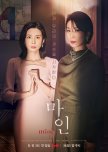
Within a male dominated spectacularly exclusive golden Jaebeol-Cage women stand up for their rights
The (fictional) Hyowon Group's extended family is among the richest one percent in the country. This clan is analyzed in detail with their personal stories and their dynamics among themselves. It quickly becomes clear that despite all the wealth, nobody is happy here. They are prisoners in a golden cage of their own greed. The peacock cage in the park of the estate is a beautiful allegory for this.If they were just satisfied with what is, they might be better off. But it always has to be more. "Mine... Mine... I want it... I want more... I don't want to give it away..." Communication is replaced by competition, love and comfort by money and luxury. The price has to be payed by suffering souls. Having lost their grounding in trust, sympathy and kindness, they somehow blindly fight for a substitute. "Mine" thus illustrates their sandbox games including mud fight. Maybe with designer sand - the architecture and furnishings are spectacularly exclusive down to the last detail. You don't have to like that, but it is supposed to impress - and it does.
Still, mud is just mud... And it is disgusting to deal with.
The Jaebeol orbit traditionally is a man´s world. In this respect the KDrama "Mine" choses a unique and inspiring approach: Here concentrated, intelligent and courageous women's power is fighting for liberation from the golden cage. This is possible in South Korea in 2021. Also that one of the female protagonists is in love with a woman. Can women set themselves free from male dominated power structures and constraints? There are some truly beautiful, touching, powerful moments of sisterhood and women's power. Sometimes offensive, sometimes subtle.
If you like, "Mine" is also a contemporary social criticism, quietly hidden behind the curtain of an exclusive and alien world of feudal arrogance. The orbit of the Jaebeol may be far far away from the rest of the world, but with all the interpersonal and inner-psychic dynamics (actually quite ordinary and human) that are in focus here, it comes very close to the themes of 'normal' (South Korean) society - with its social constraints, its strict hierarchical structures and their prejudices that put chains on people of almost every social class. The audience is thus free to choose who from the Hyowon clan household they want to identify with. And whether they want to dare to break free, too, and take a different path (together with one or the other protagonist).
--------------------- SIDE NOTE: --- Jaebeol and their different topics among second and third generation heirs ---
The rise of the founding Jaebeol, like the growth of their companies, was shaped by strong patriarchal hands. Hardworking hands, too. However, this first generation patriarchs are slowly dying out... this being accompanied by creeping processes of change. The founding fathers knew where they came from. Plus, from the very first hour, they had long-standing, loyal relationships with their assistants, secretaries, drivers, foremen that had grown over time (even if they were characterized by dependency)... and over time they have built up a systematic network that takes care of their interests wherever they wish.
Their offspring however is already born "with the golden spoon in their mouth", spoiled by wealth and far away from the ordinary people who work for them and their living environment. These Jaebeol are increasingly preoccupied with their ego, family dynamics, scandals and inheritance disputes. They lack ´brothers in arms´, who shed their blood, sweat and tears - thus they lack someone they can trust. The principle of bribery may still work, yet the reins are now in several, increasingly fractious hands. By now many Jaebeol-Clans have already begun to dismantle their power structures by themselves. And if not, their past machinations are increasingly catching up.
"Mine" documents quite vividly how the Jaebeol families dismantle themselves... how the heirs identify with their (still young!) identity as Jaebeol as if they were feudal old noble blue blood... They haven't really had to prove themselves yet and by their arrogance are already failing in the second and third generation. Additionally, the youngest generation increasingly is no longer interested in the corporate empire, let alone their management...
In this respect "Mine" also represents a new variety of topics within the Jaebeol-Genre in KDramas for the 2020s. ´Competition´, ´cabal´ and ´revenge´ as leading subjects have already been processed back and forth since the early hour of KDrama. ´Justice´ was an increasing topic during the last decade. ´Breaking free´ as a Jaebeol-topic however so far is rather new and rare, yet it might increase in the future...
-------------------------------------------
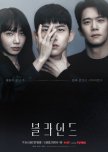
Exciting, yet gloomy thriller. The murder case being tried by a jury is just a kick off for more…
"Blind" is a fabulous, exciting, somewhat dark thriller."Blind" weaves its fictional story around 'survivors' of brutal child abuse and severely traumatizing exploitation as kids. These 'survivors' meet each other and their perpetrators 20 years later as adults. Each of those involved tried in his/her own way to come to terms with the past and lead a more or less normal life. Not only the abusive childhood, but also its psychological effects on their later life are a severe issue - and become a topic here. In addition, in this context complex interdependencies between the perpetrators of the time are dissolved and - against the background of a brutal variant of public vigilante justice - the original roles as perpetrators and victims are turned upside down.
"Blind" is haunting. The focus is on a murder case that is being tried by a jury. More murders follow. The dramaturgical setting is to some extent perhaps a bit reminiscent of an Agatha Christie novel - insofar as suddenly almost everyone in the case-related group of the selected jury could be the perpetrators... the distribution of roles between judges, investigators, victims and presumed suspects is also becoming increasingly opaque and fatefully intertwined. To pretend that one can turn a 'blind' eye to what used to be is no longer possible. Everyone must now look at the past and (even if it is perhaps a little late) bear the consequences. Magnificent.
----- SIDE NOTE: ---Child abuse - a sad and highly topical issue in South Korea ---
The thriller obviously saddles its story on the unspeakably sad topic of child abuse, which due to its unbroken topicality has increasingly made it into South Korea's series and film productions of recent years (among others "Children of Nobody" and "Mother" as drama or "Miss Baek" and "Bring me Home" as movie.) Many a well-established member of society prefer to look the other way when unbelievable deals are being made concerning minors, as long as they might even benefit themselves. And any 'survivors' can be glad if they manage to split off the traumatic experience to some extent - nevertheless most often PTS comes right along. Usually, those ´survivors´ until old age are psychologically still stuck in that desperate helplessness and inner agony of the past.
A South Korean government study from 2021 reveals, that abusive trafficking in minors has been rampant and even increasing in recent years. There is an acute need for action regarding more effective education in all public areas - from prevention to investigation and criminal prosecution up to employee training. A big problem with this: usually police officers or other officials are directly involved and work together with the traffickers, who specialize in the ruthless exploitation of minors. If the children and young people survive this, the psychological consequences of these deeply traumatizing experiences will be very hard - if at all - to be overcome. They are left helpless at the mercy of adults (who actually should take good care of them) and utterly hopeless in the face of a society that turns a blind eye to their torment. The only thing that is left: feeling betrayed and/or obviously of no worth whatsoever...
--------------------------
PS:
It may be that in reality a larger task force would have been set up to investigate the serial murders of the jury members. In my opinion, however, the KDrama didn't take anything away from keeping the circle compact in order to tell the story in its essential entanglements in a powerful way.
P.P.S.:
At last, I don't want to leave a pleasant detail (I think) unmentioned. We have seen it so often in KDramas: within the social ranking in South Korea, the older colleagues are obviously allowed to rebuke the younger ones with a shove, a kick or a snap on the forehead. (In view of my German socialization background, that is unheard of, but ...) In "Blind" one can now observe (among other things) that a transformation in this natural ranking behavior may be starting to happen within the younger generation: a colleague police officer in "Blind" actually gives back to his colleague and stands up for himself. So far, I have seen this rather rarely, if at all. Until now, as a rule in comparable situations, the fist usually remained in the pocket. In the mass consciousness, KDrama is relating to, starting 2022 such physical rebuke might obviously no longer be tolerated as a matter of course. Stand-up-for-your-rights seems to/wants to become possible - like a wind breeze of change coming up within a hierarchical tradition since centuries chiseled in stone...


 9
9 38
38 15
15


















